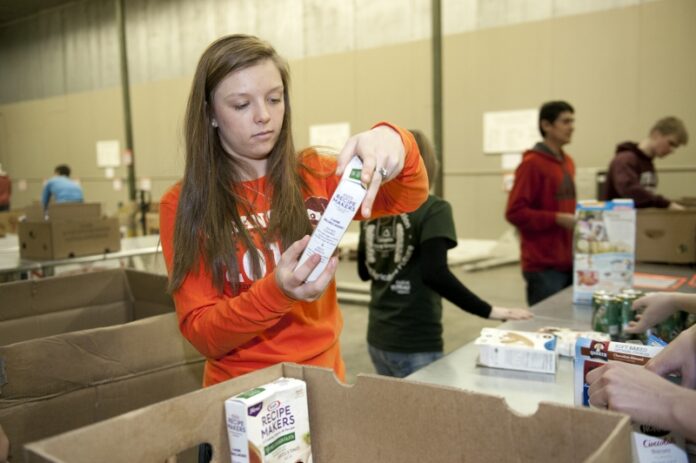
On a campus that serves thousands of meals each day — meals of lobster, fresh fruit smoothies, artisan sandwiches, gourmet pizzas, and all-you-care-to-eat buffets — it’s difficult to grasp that people in our own community do not have enough food for adequate nutrition.
However, recent statistics from Feeding America show that one in eight Virginians struggle with hunger, and nearly 13 percent of people in Southwest Virginia do not always know where they will find their next meal.
This spring, VT Engage: The Community Learning Collaborative created a campaign to compete for funding from Campus Kitchens, a non-profit organization that empowers student volunteers to fight hunger. Virginia Tech won a $5,000 grant after receiving nearly 10,000 votes. Later this semester, VT Engage and Virginia Tech Dining Services will begin a pilot effort to expand food diversion efforts through a Campus Kitchen, with an official launch in fall 2015. The Campus Kitchen will be fully run by student volunteers.
“Campus Kitchens’ emphasis on student involvement provides not only an opportunity for students to be directly involved in food diversion, but it further educates them on the degree of food insecurity in the surrounding community,” said Amanda Qadado, who received her bachelor’s degree in psychology from Virginia Tech in 2014.
There are currently 42 Campus Kitchens on university and high school campuses across the country. Though the Campus Kitchen structure varies, each project uses the same four components of food recovery, meal preparation, meal delivery, and empowerment and education.
Unused, quality food is picked up from dining centers, and student volunteers utilize donated kitchen space to prepare nourishing meals and food donations. Volunteers then have the opportunity to deliver these meals to low-income families and individuals, interacting with recipients and gaining a greater understanding of poverty issues. Campus Kitchens also has a platform for educational initiatives such as culinary training for unemployed adults and nutrition classes for children.
“Within the Virginia Tech community, we’re noted for our ongoing commitment to top-quality dining options on campus, a continual commitment to advance our institutional sustainability efforts, and a university value of service beyond the campus,” said Perry Martin, senior associate director of community learning for VT Engage. “The Campus Kitchen effort provides an opportunity to utilize these three university strengths in one project.”
The Virginia Tech Campus Kitchen effort began with Qadado, a VT Engage AmeriCorps VISTA member, who put her career goals on hold for a year to serve with AmeriCorps, which pays a living allowance that intentionally puts her at the poverty level.
“I am bound by the monthly stipend that allows me to pay my rent and bills, with not much wiggle room,” Qadado said. “There is a reason I know at what grocery stores you have to verbally tell the cashier you are using food stamps so he or she can press a different button on the register. My current role has further educated me on the stigma of receiving benefits like food stamps, and I wanted to use the rest of my VISTA year to make a difference for those who do not have adequate access to food and other resources.”
As part of her AmeriCorps program, Qadado needed to invest in a sustainable program that impacts the community long after her year ends. She decided to target hunger issues.
Qadado contacted Dining Services and found that the department already participates in various food diversion efforts, which take excess food headed to the trash and redistribute the food to hunger relief organizations.
She believes it is vital for Virginia Tech students to be a part of the process to see for themselves the need in the community, so the Campus Kitchen initiative will send trained student volunteers into the kitchens to assist Dining Services’ existing diversion process.
“The creation of a Campus Kitchen effort gives those working to eliminate hunger in our area an opportunity for greater capacity to meet community needs,” said Martin. “Our hope is that Campus Kitchens adds a valuable new dimension to the variety of ways the community supports those who are challenged by food insecurity.”
– Holly Paulette.

